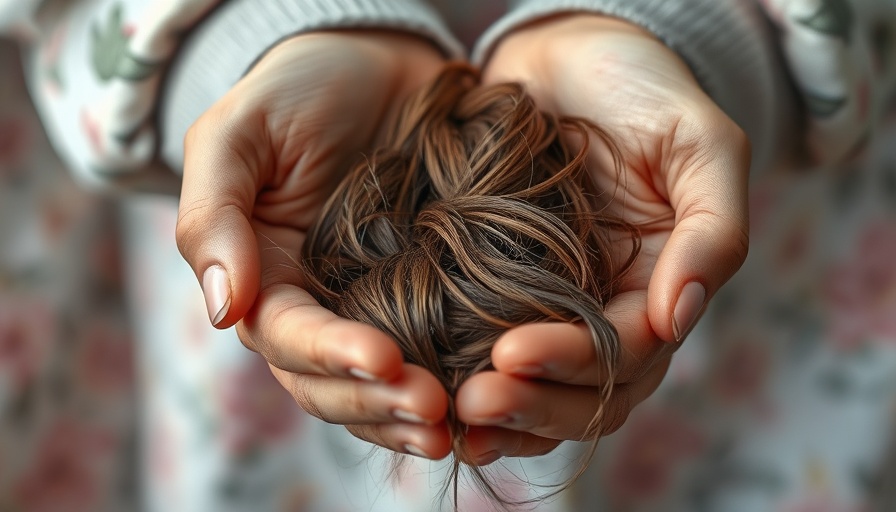
Understanding Autoimmune Hair Loss: A Growing Concern
As we approach International Alopecia Day, we’re reminded of the often silent struggles many face with autoimmune hair loss, specifically alopecia areata. Imagine catching a glimpse of your reflection, only to realize patches of hair are missing. This distressing condition not only affects one’s appearance but also their emotional well-being. Alopecia areata happens when the immune system mistakenly targets hair follicles, leading to sudden hair loss. The psychological impact can be significant, often resulting in feelings of anxiety and lowered self-esteem. Therefore, raising awareness about this pressing issue is crucial.
Symptoms to Watch For
The signs of alopecia areata can be subtle initially, which may delay seeking help. According to the National Institutes of Health, symptoms may include:
- Sudden hair loss: This often appears as round patches on the scalp.
- Sensitive scalp: Individuals may feel tenderness or see inflammation on their scalp.
- Nail changes: Dents or ridges can form, indicating an underlying issue.
- Loss of facial hair: Eyelashes and eyebrows can also be affected.
Dr. Viral Desai, a noted cosmetic surgeon, emphasizes that recognizing these symptoms early can empower those affected to seek timely and appropriate treatment.
Rising Incidence: What’s Behind the Trend?
While researchers, including those at the National Alopecia Areata Foundation, continue to delve into the reasons behind the rising incidence of alopecia areata, several potential contributing factors have emerged:
- Genetics: A family history of autoimmune disorders significantly raises the risk. The propensity for such disorders can be inherited, often triggering conditions like alopecia areata across generations.
- Environmental Triggers: Growing concerns about stress and pollution play a role. Studies link high stress levels and exposure to pollutants with the likelihood of experiencing autoimmune hair loss, particularly among those genetically predisposed.
- Compromised Immune System: factors like poor diet—especially a reliance on processed foods—and inadequate sleep can weaken the immune system, thus elevating the risk of developing such disorders.
Emotional and Mental Health Effects
Autoimmune hair loss profoundly impacts mental health. Individuals may find themselves grappling with anxiety, shame, and social withdrawal stemming from the visible symptoms of the condition. For many women, hair is emblematic of beauty and femininity, making hair loss particularly challenging to navigate. Sharing stories and support proves vital during such times, as this not only fosters connection but aids in managing emotional responses.
Practical Insights: What Can You Do?
If you or someone you know is affected by alopecia areata, it’s important to know that there are several approaches to coping with and treating the condition. Here are some actionable insights:
- Consult a Professional: Seeking advice from a hair specialist or dermatologist can provide personalized treatment options.
- Support Groups: Engaging with others experiencing similar challenges can be comforting and empowering.
- Stress Management: Practices like mindfulness, yoga, or any stress-relief techniques can help strengthen mental resilience.
Addressing Common Misconceptions
It's crucial to address some common misconceptions surrounding alopecia areata. Some believe it only affects men or that it’s solely stress-induced. However, it is a complex autoimmune condition that can affect anyone, regardless of gender, and while stress can be a trigger, it is not the sole cause. Understanding the multifaceted nature of alopecia areata can lead to better acceptance and support for those affected.
Conclusion: A Call to Action for Awareness
This International Alopecia Day, let’s champion awareness for alopecia areata. By understanding the symptoms, symptoms and management techniques discussed here, we can support those fighting this condition. Remember, if you’re facing challenges with autoimmune hair loss, you’re not alone. Reach out for help, connect with others, and take proactive steps towards managing your health. Together, we can uplift and inspire each other on this journey toward acceptance and healing.
Stay informed, share your stories, and advocate for those who may not have a voice. It’s time to break the stigma associated with alopecia areata and promote a culture of understanding and support.
 Add Row
Add Row  Add
Add 




Write A Comment